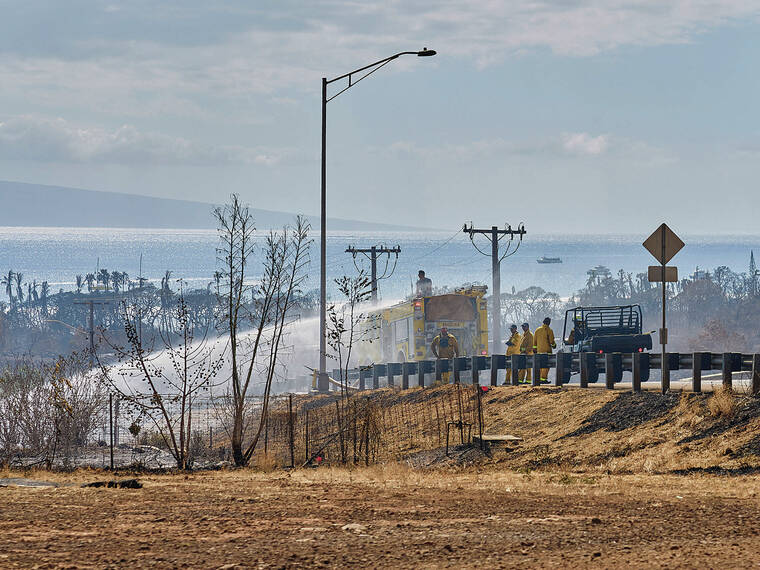Honolulu triples homeless cleanup crew efforts
The city has tripled its workforce that clears homeless encampments across Oahu every day and night — Monday through Friday — with some cleanups on weekends.
There are now three crews and a fleet of support vehicles, accompanied by Honolulu Police Department officers, that respond from midnight through 3:30 p.m. to complaints of tons of homeless belongings and debris in city parks and blocking Honolulu sidewalks.
On Friday they continued to enforce Honolulu’s 11-year-old Stored Property and Sidewalk Nuisance ordinances in Waikiki, the Ward area and various portions of South King, Beretania and Keeaumoku streets; Kapiolani Boulevard; and Kalakaua Avenue.
Despite increasing the number of crews, equipment and enforcement hours, residents and businesses continue to complain about homeless encampments all across the island.
Even after homeless people move on and their property gets taken away, the problem continues in Chinatown, said Sam Say, who works in Chinatown making funeral floral arrangements.
“The old ones move, and then a lot of new faces move in,” Say said.
Don't miss out on what's happening!
Stay in touch with breaking news, as it happens, conveniently in your email inbox. It's FREE!
Gregory Dunn, president and CEO of the Hawaii Theatre Center, sees homeless encampments all across Oahu.
“Certainly as you travel around, you do see various encampments as people try to find a place to live,” he said. “The overarching problem remains of providing wraparound housing and services to get people back on their feet.”
Dunn appreciates the ongoing efforts and concerns from Mayor Rick Blangiardi and HPD, but homeless people continue to sleep in Dr. Sun Yat-sen Memorial Park next to the theater despite more than $1 million in improvements under former Mayor Kirk Caldwell that included the removal of a water feature that homeless people urinated and defecated in and then used to wash their clothes.
Theater patrons continue to find needles and drug paraphernalia, Dunn said. Homeless people also damage plants in the park.
“The city has been very supportive of our efforts to improve the neighborhood and been very responsive when we call and request assistance,” he said. “But it’s very difficult to prevent people from camping and leaving their personal property in the bushes. … There’s still quite a bit that needs to be done.”
Along Chinatown’s River Street, the persistent cluster of encampments has “gotten quite bigger in the last six, seven weeks,” said Chu Lan Shubert-Kwock, president of the Chinatown Business & Community Association.
“We have a guy walking around breaking windows around River,” she said. “I do see new bodies coming into Chinatown looking for drugs, selling drugs … and going crazy.”
Under then-Mayor Peter Carlisle, the city’s Department of Facility Maintenance deployed a single crew in January 2012 to enforce the city’s new Stored Property and Sidewalk Nuisance ordinances to clear sidewalks and remove items that homeless people did not take with them.
In 2014 the American Civil Liberties Union of Hawaii failed in U.S. District Court to overturn the city’s homeless sweeps. But in 2015 the ACLU did win a federal court ruling that still requires the city to store homeless property — such as tents, clothes and bicycles —so people have an opportunity to retrieve it.
The court also ordered the city at the time to post legal notices in homeless shelters and distribute them among social providers for 30 days telling homeless people in seven different languages that the city’s enforcement efforts may have violated their Fourth Amendment right against unreasonable seizure of property and their 14th Amendment right against deprivation of property without due process under law.
The city also must give homeless people advance notice that a sidewalk is about to be cleared, along with any belongings left behind.
“The requested order (filed by the ACLU in 2015) does not require the city to store excrement or other items that could not possibly meet the definition of ‘property’ in the city’s laws,” according to the motion. “The order does, however, put an end to the city’s consistent practice of destroying life necessities such as tents, bedding, clothing, and the like.”
Now the city sends out two crews that work from 7 a.m. to 3:30 p.m. Monday through Friday and a third crew that focuses on Waikiki from midnight to 8:30 a.m., according to city spokesperson Scott Humber.
The crews range in size from three to four workers, including supervisors.
Their equipment includes rear-loader compactor trucks, flatbed trucks and crew cab and pickup trucks.
The second daytime crew was originally intended to work weekends when it was created in 2018.
The Department of Facility Maintenance “is not in a position to start up the weekend crew as it is dependent on HPD support to ensure safety of City crews,” Humber wrote in an email to the Honolulu Star- Advertiser. “For now, weekend work is scheduled during HPD special ops on OT that is offered to all three crews.”
The crews team up for big cleanups.
“As needed, the night crew may assist the day crew on overtime when large quantities of property storage are anticipated and similarly, when there is an anticipation of large amounts of property storage during park closure enforcement or during HPD special ops activities, the day crew may be asked to assist during nighttime hours,” he wrote.
REPORT SUSPECTED VIOLATIONS:
>> Access the Honolulu 311 App or email the city’s Department of Facilities Maintenance at dfmroads@honolulu.gov.
Source: City and County of Honolulu




